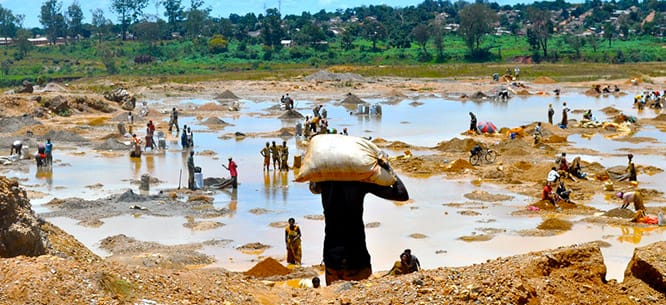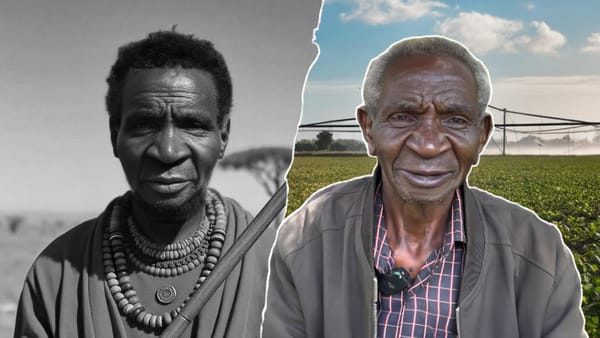The Resource Curse
The resource curse, also referred to as the paradox of plenty is a term used to refer to the phenomenon of nations with an abundance of natural resources but have high levels of poverty because they are unable to transfer the wealth to their ...

The resource curse, also referred to as the paradox of plenty is a term used to refer to the phenomenon of nations with an abundance of natural resources but have high levels of poverty because they are unable to transfer the wealth to their populations. The resource curse phenomenon can be said to be prevalent in Africa and other ‘third world’ countries in places such as Asia, the Middle East and Latin America which have a lot of natural resources but have higher poverty rates than some countries with less natural resources. Within such countries, there is an inverse relationship between the export of natural resources and economic growth rates. It is a widely accepted assumption that natural resources are a major advantage for countries to experience development and rapid growth through industrialization. It is perplexing that countries with plenty of natural resources in Africa such as Angola, the Democratic Republic of Congo and Nigeria continue to have some of the highest poverty rates in the world. This article explores the resource curse issue in Africa which has led to high levels of poverty and even dehumanization of the African populations.
Natural resources are one of the four key factors that facilitate economic growth. Economists argue that there are four determinants of economic growth namely capital, technology, natural resources and human resources. Natural resources are defined as materials which exist in the natural environment that are not only scarce but also useful in consumption or production either in their raw state or after processing. These resources include mineral coats and fossil fuels among others. It is interesting that in Asia, countries with scarce natural resources such as Taiwan, Korea, Japan and Singapore have higher living standards than countries with abundant natural resources such as Nigeria, Congo, Angola, Sudan and Niger. It is also true that there are some countries which have utilized their natural resources to create economic prosperity such as the United Arab Emirates, Norway and Canada. The inability to turn natural resources into economic prosperity in Africa can be attributed to several factors including political mismanagement, conflicts/wars, price volatility and over dependence on natural resources exports among others.
The Dutch Disease
The Dutch Disease is defined as a phenomenon where the economic development of a particular sector such as natural resources leads to a decline in other sectors. This is attributed to the fact that the export/exploitation of natural resources leads to a rise in the exchange rates and wages which drive out the pre-existing export and import industries. The phenomenon became apparent in the Netherlands after the discovery of huge natural gas reserves in Groningen in 1959. As expected, the Dutch wanted to exploit the natural gas through exports for profit. However, once they began to export the gas, the country began to experience a decline in its ability to compete against other nations’ exports. The export of gas led to the appreciation of the Dutch currency which negatively affected the country’s ability to export other products. The growth of gas exports led to the shrinking of the export economy leading to a recession. This process has also been experienced in a variety of countries around the world such as Angola, Venezuela and the Democratic Republic of Congo.
The Dutch disease phenomenon can make a country’s exports less competitive in global markets. The fall in exports creates a compensating unfavorable balance of trade. This is because as imports become cheaper than locally produced goods, the internal employment declines and with it, the skills and manufacturing capacities of the country. As a result, governments are forced to use their resources to create employment artificially. In addition, as the income from the exploitation of natural resources grows, governments increase their spending on health, public infrastructure, military and welfare. If this is done in a corrupt or inefficient manner, it can be a liability on an economy.The decline in exports can also lead to an increased dependence on natural resource exports leaving the economy vulnerable to commodity price fluctuations.
Factors that Cause the Resource Curse
Lack of Development of Human Capital/Resources
One of possible effects of the dependence on income accrued from the exploitation of natural resouces can be the crowding out of human capital. This is because nations which are reliant on the export of natural resources can neglect the development of human capital through education as they may not see the immediate need for it. In contrast, resource poor nations such as South Korea, Taiwan, Japan and Singapore put enormous efforts into education to develop skills and facilitate the running of the economy. In some countries such as the Democratic Republic of Congo, poverty and higher wages in the extractive sectors encourage young people to drop out of school to seek employment opportunities. It is noteworthy that this does not have to be the case because competent governments can use the income from the extractive sector to invest in teachers, schools and research to enable their young people to develop skills that enable faster economic growth rates. Unfortunately, come resource rich countries have not been able to do this due to factors such as corruption and the mismanagement of funds.
Macroeconomic and Revenue Volatility
The prices of commodities and natural resources are prone to fluctuation. A good example is crude oil prices which fell to below the lowest levels during the COVID pandemic. From 1998 to 2008, the price of oil rose from $10 to $145 per barrel before falling to $60 per barrel in a few months. Countries which are dependent on revenues from natural resources such as Angola are vulnerable to price fluctuation leading to disruptions in the servicing of debts and government planning. The abrupt disruptions which result from this can lead to the reduction of spending on welfare, the breaking of contracts and social instability.
Moreover, the susceptibility to revenue fluctuations can be exacerbated in cases where the governments borrow heavily in foreign currency. Resource rich countries can appear to be credit worthy because of their wealth meaning that during resource booms, banks and other lenders invest in them through loans. However, if the commodity prices fall, the ability of the governments to service the debts is significantly reduced. For instance, countries such as Angola and Nigeria borrowed heavily when the price of oil was high and have then struggled with debt repayments. As a result, Angola has had to renegotiate their debts with China, the International Monetary Fund (IMF )and the World Bank among other lenders. Nigeria also relies on injection of funds from the IMF to maintain it macroeconomic stability.
It is noteworthy that historically, the prices of commodities tend to fluctuate more than manufactured goods. Evidence from recent history proves that both fuel and non-fuel commodity (such as metals) prices have had periods of extreme volatility. Resource wealthy countries in Africa have experienced boom-bust cycles over the past few decades. In spite of the recent increases, in real terms, most of prices of non-fuel natural resources have remained below their historical peaks. Over the past fifty years, the prices of commodities have fallen relative to consumer prices at about a 1.6% rate. The downward trend is normally attributed to large gains in productivity in metal sectors and agriculture relative to other sectors of the economy.
Corruption and Mismanagement.
The rise in incomes from natural resources often encourages rent seeking and a decrease in the quality of public spending. The concentration and centralization of financial resources from resource booms tends to encourage imprudent and excessive investment. This causes mismanagement and in some circumstances, massive corruption. The key problem is that revenues from natural resources tends to replace more sustainable/stable sources or revenues, increasing the problems associated with accountability, development and transparency. With significant resource incomes, the reliance on non-resource revenues decreases. This can free resource exporting governments from the kind of citizen demands for transparency and accountability that arise when the citizens pay taxes directly to the government. As such, the dependence on natural resource export revenues can sever important connections between the governments and people which are related to control mechanisms and popular interests.
The larger the government purse, the less noticeable the corruption and mismanagement of pubic funds by interest groups. Rent-seeking tends to be greater in resource rich nations because the wealth is concentrated in the public sector. As such, most of the rents raised in such economies are channeled by bureaucrats who mostly come from politically dominant groups. This kind of rent-seeking creates negative results for the economy. First, rent-seeking behavior creates substantial losses on the economies. In addition encourages the maximization of rent seeking instead of focusing on long term development goals. Rent-seeking also leads to the creation of extremely powerful and wealthy lobby groups that are able to block reforms that benefit the majority of people. Morevoer, rent seeking causes a decline in innovation and the creation of monopoly power in an economy. For example, it is evident that governance indicators such as accountability, government effectiveness/efficiency, regulatory quality, political violence and instability, control of corruption, the rule of law are significantly weaker in African countries that rely heavily on oil revenues.
Poor Investment Decisions and Misallocation of Revenues
Relevant literature, research and studies emphasize the role of governments in poor investment decisions and misallocation of resource incomes. Resource booms can have negative impacts because the create incentives for leaders/politicians to engage in the inefficient redistribution of wealth in return for political favors and support. It is noteworthy that the status of existing institutions (prior to the resource boom) is important because it determines the extent to which leaders can respond to such perverse incentives. In addition, the pressure from the citizens to increase public spending can lead to reckless spending and inefficient redistribution in the form of subsidies to farmers, protectionist policies to protect local industries from international competition and public employment provisions which only weaken the economy in the long run.
Poor Industrial and Economic Policies
In the 1970s and 1980s, many resource rich nations adopted industrial policies aimed at import substitution through the allocation of subsidies to support infant industries and protectionism. This was viewed as the way to break away from the chains of underdevelopment. However, the subsidies proved to be unsustainable after the fall of revenues. Moreover, the protectionism and subsidies reduced the need for the creation of competitive manufacturing industries. The fact that many development economists view competitive manufacturing as a major source of technological progress means that these policies had serious negative impact on these countries’ economic progress. The abandonment of market discipline and the related accumulation of economic distortions negatively affects competitive diversification and is the major cause of the under-performance witnessed in many resource-rich African nations in the 1990s and 1980s.
Civil Wars and Other Conflicts
The evidence that the abundance of natural resources increases the likelihood of civil conflicts or wars and stimulates theft, looting and violence between rival groups is very strong. The fact that many countries in Africa are highly reliant on mineral, oil and gas exports means that they are vulnerable to conflicts associated with natural resources. This explains why a significant share of civil wars in the world have taken place in Africa. Moreover, the income and booty futures natural resources are also used to prolong wars. Booty futures are defined as advance rights given by rebel groups/governments to companies to extract natural resource wealth in areas that the rebels intend to capture in a civil conflict. Easily lootable natural resources such as gemstones tend to be key contributors to the prolongation of conflicts as groups fight to gain control over them.
Since the 1960s when most African nations became independent, there have been nearly 100 violent changes in governments in the continent. Other countries have witnessed conflict, civil wars and internal strife. There are several characteristics that differentiate the post Cold War conflicts in Africa.One is that natural resources are prominent feature in these conflicts both in circumstance of environmental scarcities (land) and abundance (mineral and oil). The second characteristic is that the conflicts tend to involve local non-professional fights and non-state actors who challenge the legitimacy and authority of weak states, neighboring states, trans-global forces and regional actors. Nature resource based conflicts such as civil wars and secessionist movements have therefore been commonplace in the continent. Popular examples include the ‘blood diamonds’ in Angola and Sierra Leone, oil conflicts in Sudan and Nigeria, mineral wars in the Democratic Republic of Congo and timbers wars in Liberia and Sierra Leone among others. Even so, local conflicts over resources such as forests, water, land and wildlife are far more common. In many countries, such conflicts overwhelm the judicial system and traditional mediation platforms.
Although the roots of civil wars/conflicts in Africa are complex and lie in a variety of factors, there is strong evidence that natural resources such as oil and minerals increase the likelihood of wars through the financing rebels and the weakening the states especially in Sub-Saharan Africa. In some cases, this can be attributed to the involvement of multinational companies. As such, it is always important to investigate whether a conflict is caused by local grievances such as the mistreatment of certain groups or greed probably induced by high rents from natural resources highlighted in countries such as Nigeria, Congo and Sierra Leone. The three factors which determine the onset of armed conflict- low growth, low income per capita and natural resources are prevalent in most parts of the continent.
State Predation
The achievement of political independence did not lead to a transformation of a significant number of African stated which continued to be authoritarian and forceful. Instead of working towards transforming the state to work for the public good, some of the emerging leaders in post-colonial Africa used the large authoritarian structures for private benefit. A predatory state is characterized by the personalization of networks used in delegation of power and the concentration of power at the top of government which is maintained through brutal repression. In such cases, corruption is also used to keep the loyalists in check.
Predatory states have two key consequences on natural resource revenue and wealth management in most weak African countries. First, political support is based on clientele networks that connect power-holders with parts of the population. Second, the access to state power is equal to access to present and future wealth. These networks tend to be formed along religious, ethnic, economic and regional lines. Predatory states use various violent as well as non-violent means to manage oil and minerals resources and to redistribute income generated from their sale. The common strategy is to agree on royalties and other income agreements with foreign corporations. These deals are often reached in an opaque manner that makes it difficult to track how the revenue is generated and spent. In some cases, only small revenues reach the state treasury whereas the real royalties are paid to the politicians, mostly in their off-shore bank accounts.
Vested Interests of International and Regional Actors.
The plunder and exploitation of natural resources is not always limited to local actors in weak states. Sometimes it involves international actors and neighboring countries who arm insurgents and rebels. The weakness or failure of states often produces ripple effects which are felt by other countries in the region. For example, the interconnection of conflicts in Sierra Leone and Liberia enabled the smuggling of large amounts of diamonds and timber by shadow economic actors and miners. A key aspect of natural resource conflicts is the involvement of third party actors and governments seeking to plunder their neighbors. Of all the conflicts in Africa, none shows the complex connection between wars and natural sources than the wars in the DRC where countries such as Rwanda and Uganda have been accused of arming rebels to plunder minerals such as gold and coltan for sale to multinational companies.
The corporate practices of international actors are also major issue. Economic globalization has enabled the rise of profits from the extraction of natural resources in African states. This has attracted a multitude of companies seeking to exploit the impressive opportunities to make massive profits. Some of the multinational companies are exploitative and seek to exploit conflicts to maximize their profits. Unlike manufacturing and other tertiary sectors, extractive industries do not relocate after the eruption of conflict because of the importance of natural resources such as gas and oil as well as the long term and capital intensive nature of the investments. This means that some of the companies are not deterred by conflicts. In fact, some even pay rebel groups to protect their investments leading to the prolongation of conflicts. It is well known that some of the multinational corporations also use corruption to get sweet heart deals at the expense of the local populations.
Successes stories.
Botswana
Natural resources and the extractive industry has contributed to the socio-economic development in some African countries which have managed to avoid the natural resource curse. A good example is Botswana’s mineral sector that has uplifted the country and played a crucial role in its development. Through proper management of its natural resource wealth, Botswana has been able to transform itself from one of the poorest countries in the globe at the time of independence in 1966 to a middle income state. Today Botswana is a major exporter of diamonds as well as copper and nickel. The country’s record of mineral-led development is impressive in Africa. This can be attributed to the fact that it is considered to be one of the least corrupt countries in the continent. It also has ability to manage and contain the environmental damage associated with the extractive sector. Moreover, Botswana has well managed finances with low debt and high credit ratings. It is noteworthy that the country has not relied on low tax incentives but on an open, transparent and stable policy regime free of political interference and corruption which allows investors operational freedom once contracts have been signed.
Botswana enjoys favourable balance of payments which enable it to invest in a strong education system and infrastructure which improves the lives of the people. Today, it has a lot of skilled people who work in the extractive industries and other sectors of the economy. In addition, it has also invested in value addition programs to facilitate the processing of minerals such as diamonds. The sale of value added products is important because it increases the revenues and creates high income jobs. The country also has other natural resources such as wildlife that attract tourists who bring in foreign exchange and create jobs in the hospitality sector.
References
African Development Bank. (2007). African development report 2007. OUP Oxford.
Dwumfour, R. A., & Ntow-Gyamfi, M. (2018). Natural resources, financial development and institutional quality in Africa: is there a resource curse?. Resources Policy, 59, 411-426.
Frynas, J. G., Wood, G., & Hinks, T. (2017). The resource curse without natural resources: Expectations of resource booms and their impact. African Affairs, 116(463), 233-260.
Henri, P. A. O. (2019). Natural resources curse: A reality in Africa. Resources policy, 63, 101406.
Kurecic, P., & Seba, M. (2016). The Resource Curse in Sub-Saharan Africa: A Reality Corroborated by the Empirical Evidence. Economic and Social Development: Book of Proceedings, 164.
Moti, U. G. (2019). Africa’s natural resource wealth: A paradox of plenty and poverty. Advances in Social Sciences Research Journal, 6(7), 483-504.
Muigua, P. D. (2020). Exploited, poor and dehumanised: Overcoming the resource curse in Africa.
Mulwa, R., & Mariara, J. (2016). Natural resource curse in Africa: Dutch disease and institutional explanations. Report Prepared for the International Food Policy Research Institute. Washington.
Puscaciu, V., & Puscaciu, F. D. (2015). Paradox of Plenty or Resources Curse?. Knowledge Horizons. Economics, 7(3), 239.




